Hezbollah Says It Can Produce Precision Missiles With Iran's Help
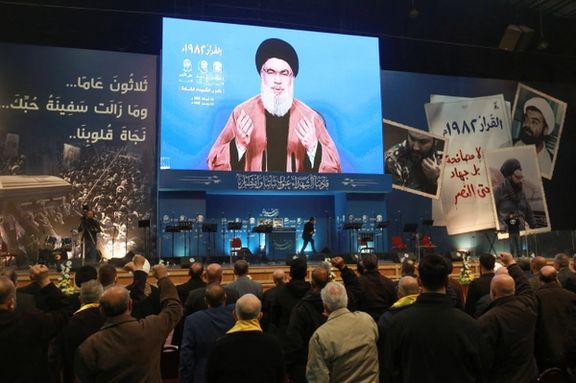
The leader of Iran-backed Hezbollah group said for the first time on Wednesday that it can convert thousands of rockets into precision missiles within Lebanon.

The leader of Iran-backed Hezbollah group said for the first time on Wednesday that it can convert thousands of rockets into precision missiles within Lebanon.
"We have been producing drones in Lebanon for a long time, and whoever wants to buy them, submit an order," Sayyed Hassan Nasrallah said in a televised speech to followers.
He said Hezbollah was able to transform standard rockets into precision missiles with the cooperation of "experts from the Islamic Republic of Iran". Such production had been spurred by arch-foe Israel's increased use of drone technology, he said.
Hezbollah and Israel fought a month-long war in 2006 and have at times in the years since traded fire across Lebanon's southern border.
There was no immediate Israeli response to Nasrallah's statements. While the Israeli military outguns Hezbollah guerrillas, Israel worries that in a future war they could use precision-guided missiles to knock out parts of its national infrastructure like ports or power stations.
Israel has said in the past that it has brought down several Hezbollah drones that had crossed into Israeli air space. Hezbollah says its increased anti-drone capabilities have led to a decline in Israeli drone overflights.
Israel last week published the names of three Lebanese companies that it accused of supplying materials for Hezbollah's precision-guidance missile project, a move designed to generate international economic pressure on the Shi'ite Muslim group.
"Hezbollah are endangering the citizens of Lebanon and the state of Lebanon," Israeli Defense Minister Benny Gantz said in a statement. Israel, he added, would "act resolutely in the face of the Iranian precision project operating from the heart of Lebanon".
Reuters Report
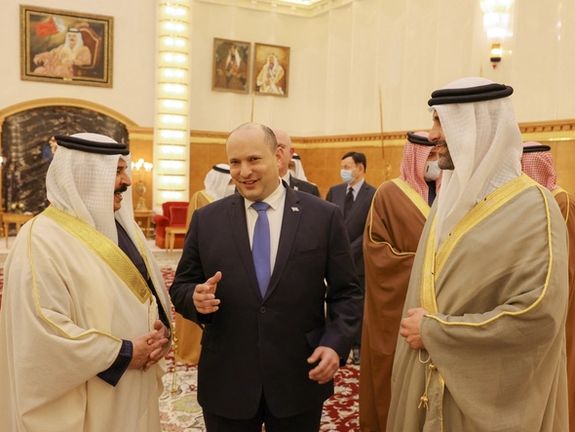
Bahrain's Crown Prince Salman bin Hamad Al-Khalifa has accepted an invitation from Prime Minister Naftali Bennett to visit Israel in "the near future.”
Abdullatif Al-Zayani, the Bahraini foreign minister, announced the plan during the visit to the kingdom Tuesday of Israeli Prime Minister Naftali Bennett, which Al-Zayani said had included discussions of the "Iranian nuclear file and terrorism."
Bennett said he was seeking a “new regional architecture” with Arab Gulf states – referring principally to Bahrain and the United Arab Emirates, who in 2020 normalized relations with Israel – against "enemies who are fomenting chaos and terror."
Bennett portrayed his two-day trip largely as a common stance against Iran and its allies, including Yemen's Ansar Allah, known as the Houthis, whose battle in Yemen against Saudi- and UAE-led forces has spilled over this year into missiles fired at the UAE.
Bahraini opposition activists said Tuesday that at least four people had been arrested in protests against Bennett’s visit in several villages inhabited by Shia, who make up the majority in the country ruled by the Sunni Khalifa family. Bahrain, which crushed protests in 2011 with Saudi help, blames unrest on Tehran.
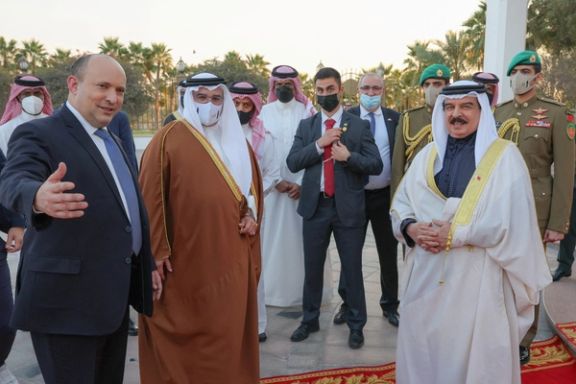
After meeting King Hamad bin Isa Al Khalifa, Bennett stressed the importance of a variety of links that have mushroomed between Israel and some Arab Gulf states since the 2020 ‘normalization.’ "We don't have enough trade, we don't have enough tourism - and that is what this visit is all about," Bennett said. "I'm going to be your ambassador there (in Israel). I want to 'sell Bahrain'.”
The two sides announced a research and development accord and that talks would continue on facilitating investment flows. Bahrain’s has severe fiscal problems with public debt running at around 130 percent of GDP. A bilateral security accord reached in February could give Bahrain access to controversial Israeli technology used to monitor dissidents.
Israel’s Growing Military Role
The proposed visit to Israel by Crown Prince Salman will irk the Palestinians, who see ‘normalization’ as a betrayal of their aspiration for a state. Qatar this month reiterated its support for a Palestinian state as a precondition for ‘normalization,’ the stance agreed in the 2001 Saudi-drafted Arab Peace Initiative.
Bennett’s visit Tuesday to the Bahrain base of the US Navy’s Fifth Fleet highlighted Israel’s growing military role in the Persian Gulf. A US official said Tuesday the navy was considering adding unmanned Israeli boats to its joint regional operations and was also interested in Israeli-made drones.
Officials also said Israel would become the 29th country to post an attaché to the fleet's Manama headquarters. Meeting Fleet commander Vice-Admiral Brad Cooper Tuesday, Bennett said he expected "the cooperation among the region's countries and powerful ally the United States will keep getting closer.”
After the warm relationship between former Israeli premier Benjamin Netanyahu and former US president Donald Trump, Israel’s relationship with the US has been strained by its leaders’ continued opposition to the 2015 Iran nuclear deal, which world powers including the US are trying to revive in talks with Iran in Vienna.
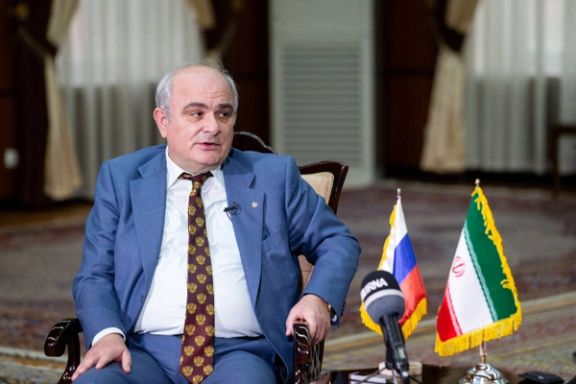
The Iranian public and the government have criticized Russia's ambassador for honoring a 19th-century forerunner, whom they blame for humiliating their country.
The fracas arose after the embassy’s posted February 10 a photo of the Russian ambassador, Levan Dzhagaryan, laying a wreath at the foot of a monument to Alexander Griboyedov inside the embassy compound on Diplomats Day.
The social-media posts expressed outrage because of Griboyedov’s role in the 1828 Torkmanchay Treaty, ending the Russo-Persian War (1826-1828) and under which the Persian Empire ceding areas in the south Caucasus to the Russian Empire. Griboyedov was killed by a mob in Tehran in 1929 after being appointed Russia's ambassador.
In recent months anti-Russian sentiments have been quite high in Iran. Many Iranians interpreted the embassy's recent post as a reminder of Iranians' “humiliation” by Tsarist Russia, as some criticized its coincidence with the Islamic Revolution's anniversary, and others saying it amounted to a threat.
Foreign ministry spokesman Saeed Khatibzadeh said Monday that while the ministry had registered a protest, Tehran and Moscow had "excellent relations."
"Any prominent diplomat and seasoned ambassador knows that he must not do things that hurt the feeling of the people of his host country,” the spokesman said. “These matters have obviously been relayed [to Moscow] through the appropriate channel and will be relayed in the future.”
Lingering in history
"We should learn from history but not linger in it,” assistant foreign minister Raoul Mousavi wrote Tuesday. “Lingering in history does not benefit relations between nations.” Mousavi shared a photo showing damage to the minaret of Imam Reza Shrine in Mashhad from Russian artillery shells in 1912, part of the instability that led the Cossack-trained Reza Khan seizing power in 1921 and proclaiming himself Shah.
Former Iranian diplomat Kourosh Ahmadi in a Telegram post quoted by Hamshahri newspaper argued that while killing Griboyedov was unjustifiable, the ambassador had treated the Iranian government, royalty, and people with disrespect in enforcing the Torkmanchay treaty, a staple of Iranian school text-books. "It's very strange for an ambassador to honor a person with such [unfavorable] background in the country where he is posted and even to publicize it there," Ahmadi wrote.
The Russian embassy has explained that the wreath-laying ceremony is held annually as part of Diplomats Day and was unconnected to any commemoration of the 1979 Revolution. "We consider these publications provocative and aimed at undermining friendly and cordial relations between Russia and Iran,” the embassy said. “The Russian Embassy will respond firmly in the same way to such fake insinuations in the future.”
The Russian embassy suggested in a series of tweets on February 11 that Iran International TV, the United States-funded Radio Farda, and BBC Persian had all blown up social media comments.
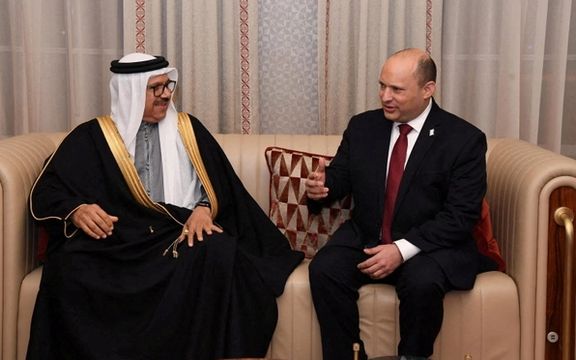
Israeli Prime Minister Naftali Bennett who is on a landmark trip to Bahrain has called efforts to revive the 2015 Iran nuclear deal a “strategic mistake.”
Bennett arrived in Manama Monday in the highest-level visit since the countries established diplomatic relations in late 2020 under the United States-brokered ‘Abraham Accords’, seen by Palestinians as a betrayal of their aspirations to statehood.
In an interview with Bahraini daily Al-Ayyam published Tuesday, Bennett said Israel and its “allies” faced "great security challenges that stem from the same source – the Islamic Republic of Iran.”
“We fight Iran and its proxies every day, and we will help our friends in strengthening peace, security and stability”, Bennett said before meeting King Hamad bin Isa Al Khalifa, and crown prince and prime minister, Salman bin Hamad Al Khalifa.
“Iran seeks to destroy moderate states that care for the welfare of their people... replacing them with bloodthirsty terrorist groups,” Bennett said.
Earlier this month Israel and Bahrain signed a security agreement, Israel's first with a Gulf nation, and Israeli contractors advise Bahraini security forces. The regime put down protests in 2011 with Saudi help.
The Bahraini opposition Wifaq party last month reiterated condemnation of Saudi “aggression” in the Yemen war, where Iran has backed opposing Ansar Allah forces.
“Over recent years, we have strengthened our military cooperation with countries in the region, whether Arab or non-Arab,” Bennett said.
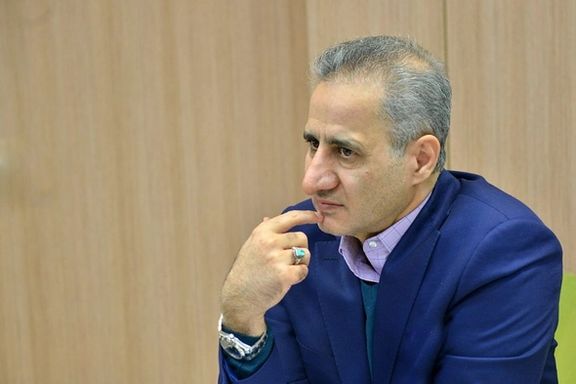
Emigration of professionals, tradesmen and manufacturers from Iran has increased due to economic and political uncertainty, a top businessman has warned.
Technicians, plumbers, cooks, electricians and experts in various fields are trying to find jobs abroad. Those who cannot emigrate to Europe and the Americas, due to financial or visa limitations, choose Turkey or the United Arab Emirates as their favorite destination.
Millions of mostly educated and professional Iranians have left the country for good since the 1979 revolution and the trend has continued for the past four decades, but a new economic crisis and uncertainty since 2018 has encouraged more people to leave.
Hamid Hosseini, a member of Iran’s chamber of commerce, told Khabar Online website on Monday that he believes all kinds of professionals are migrating, essentially because they have little hope of a better life in the future.
Hosseini, who is a top business operative in the petrochemicals sector, said what he hears from emigration agencies is that the number of people seeking services has multiplied in recent months. While in the past mostly top professionals were looking to find jobs and residence permits abroad, now tradesmen and ordinary professionals are seeking to emigrate.
“Most of these people say they will have higher incomes
abroad and a more comfortable life,” Hosseini said. He emphasized that the phrase “a comfortable life” is an important window into the thinking of prospective emigrants. It shows, he said, that people are apprehensive about the future of the country. “They are tired and concerned,” he argued.
Wages and incomes have precipitously dropped in Iran since 2018 when the United States withdrew from the 2015 nuclear agreement and imposed sanctions, prompting high, double-digit inflation.
But the economic crisis, although important, is not the only factor in nurturing pessimism. The clerical political system has become less tolerant and more erratic and unpredictable in recent years as it has faced more opposition. Younger people are tired of waiting for a bit of loosening of religious restrictions and getting a fair deal in state-run economy controlled by insiders.
Hosseini argued that neighboring countries such as Turkey and the United Arab Emirates have plans to attract qualified professionals.
Tens of thousands of high middle-class Iranians have easily bought homes in Turkey, received residence permits and moved part of their capital to the neighboring country. Iranians are at the top of foreign real estate buyers in Turkey.
But Hosseini singled out the UAE as a new attractive destination for private Iranian companies because its government has a serious plan to attract industrial manufacturers. He pointed out that the UAE is establishing an industrial zone, where investors get free land and attractive bank loans to set up business.
Hosseini was referring to an ambitious plan UAE announced in March 2021 to expand its manufacturing sector, as diversification of its economy from an energy exporter and a commercial hub also to a regional magnet for industry. The plan is to triple annual manufacturing output from around $30 billion to more than $80 billion by 2031.
A new factor encouraging companies to leave is a plan by the parliament to impose taxes on firms operating in Iran's free economic zones. Saeed Mohammad, the president's coordinator for free zones, warned Tuesday that this would be devastating for the economy as many companies would choose incentives offered by neighboring countries.
Hosseini warned that Iran can lose a lot of talent, knowhow and capital to the UAE. Asked if a nuclear agreement and lifting of US sanctions can help the situation, he said “society needs peace and tranquility” not constant interference by the government. He singled out internet restrictions in Iran and erratic laws that are often contradictory and make life for the ordinary citizen unpredictable.
He added, “Problems will be solved when we adopt moderation…which will gradually strengthen hope for the future.”
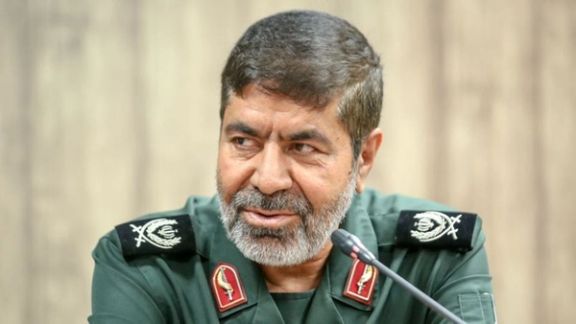
Commenting on corruption involving the Revolutionary Guards and Tehran Municipality, the IRGC spokesman denied Ghasem Soleimani had any role in the dealings.
Ramazan Sharif was commenting on a story and a 50-minute recording published by the United States-funded Radio Farda based on an audio recording of a conversation in 2018 between former Guards (IRGC) commander Mohammad-Ali Jafari and his Economic Affairs Deputy Sadegh Zolghadr.
Sharif said that the case cited in the recording had been dealt with, presumably referring to the judiciary announcing last year that four defendants had been sentenced to two to 30 years in prison over embezzlement in the case. Human-rights campaigner Emadeddin Baghi has pointed out that the tape had been published on a Telegram channel two years ago. At the time it went unnoticed by media and then the channel closed down and the recording disappeared.
In the audio file, Jafari tells Zolghadr that Soleimani, who was killed by a United States drone attack in Baghdad in 2020, knew about 80,000 billion rials (around $3 billion at the time) held by Tehran municipality and Yas Holding, a firm controlled by the IRGC's Cooperatives Foundation, and had also been aware of corruption allegations before any public indictment and trials.
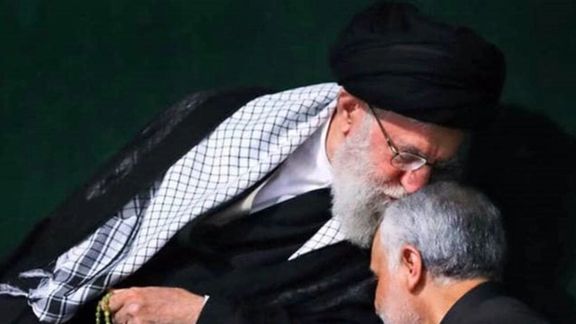
The tape even reveals that Soleimani was upset about the action taken by Jafari and Zolghadr against those who had embezzled the money and spoke to Supreme Leader Ali Khamenei about it.
The funds had been due to reach the Qods (Quds) Force, the IRGC extraterritorial arm, which Soleimani commanded. In the recording, Zolghadr says that Ali Khamenei, Iran’s Supreme Leader, had ordered 90 percent of the money, earned by Yas Holding, to be used to finance the Qods Force with the remainder going to the IRGC for general needs.
In a note Monday, Hossein Shariatmadari, chief editor of the flagship hardliner Kayhan daily, defended Soleimani and others – including Tehran mayor Mohammad Bagher Ghalibaf and the head of IRGC intelligence Hossein Taeb – mentioned in the recording. Most other hardliner media such as the IRGC-linked Javan newspaper are still completely silent about the highly controversial contents of the audio recording but in a note Monday
‘Cleverly lured’
"It was said that the Qods Force was supposed to have a share of the revenues of the said firm,” he noted. “What is wrong or dirty about this?" He claimed the IRGC and judiciary had shown their integrity by prosecuting corrupt individuals.
Shariatmadari also defended Mohammad Bagher Ghalibaf, Tehran mayor at the time, saying he had "cleverly lured" his ex-deputy, Isa Sharif, back to Iran from Canada so he could be prosecuted.
Mahmoud Abbaszadeh Meshkini, spokesman for parliament’s national security committee, Saturday detected “psychological war” in Radio Farda’s publication of the recording. “The ill-wishers have failed to achieve what they sought and use as an excuse to tarnish the IRGC’s image.”
But critics of the Islamic Republic, and specially the economic and political power held by the IRGC were quick to show the recording as proof of deep corruption, that Soleimani and other senior figures were aware of.
The problem for the regime is that in its infinite lack of transparency, once such a scandal reveals itself, all officials involved fall under suspicion. There is no proof in the recording that Soleimani personally benefitted from the corruption, but critics have a right to question everyone's role, since there is no free media in the country or independent courts to investigate the matter.
Former reformist interior minister Mostafa Tajzadeh tweeted Saturday that the case showed a conflict of interest within the military and political establishment. "Can you see the outcome of putting weapons, intelligence, money, and media [in the same hands]?” he wrote. “Is this anything other than the military's control over diplomacy and economy? Is there anyone to hold to account? Is there anyone who dares to prosecute?"